#tamasha film
Text
10 Best Tamasha Movie Quotes Every Traveler Might Relate To
Imtiaz Ali is a very well known film-maker known widely for his ability to show the reality of the society to the people in the form of entertainment. He speaks facts through his movies and all his movies leave an impact in the minds of the viewers. Tamasha is one such movie. Tamasha was released in the year 2015 and ever since then it has been ruling the hearts of many. Starring Ranbir Kapoor…
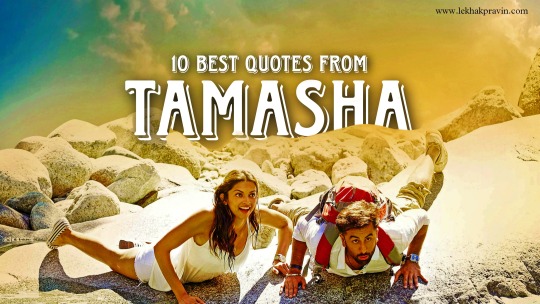
View On WordPress
#corsica tamasha#deepika dialogue#deepika padukone dialogue#deepika padukone dialogues#deepika padukone famous dialogue#deepika padukone movie quotes#hindi movie dialogue#ranbir kapoor dialogues#ranbir kapoor famous dialogues#tamasha best dialogue#tamasha dialogue#tamasha dialogue ranbir kapoor#tamasha ending#tamasha famous dialogues#tamasha film#tamasha movie dialogue#tamasha movie dialogues#tamasha movie quotes#tamasha movie story#tamasha quote#tamasha quotes#tamasha scene#tamasha story#tara from tamasha#tara in tamasha#tara tamasha#ved and tara bollywood dialogue#ved dialogue#ved from tamasha#ved movie dialogue
0 notes
Text

my condolences to all these awesome AU ideas in my drafts which will never see the light of day because i can't write.
if anyone else can see my visions, please adopt my babies and give them a good life.
#the first one might be too niche for my general tumblr dash but#its a film called Tamasha about finding yourself and everyone should go watch it#the locked tomb#gideon nav#simon snow#carry on#snowbaz#griddlehark#tamasha#bollywood#good omens#crowley
14 notes
·
View notes
Text

Tujhe toh pyaar ho gya hai pagli...
Haan ved , haan!
Par kisi aur se
#8 years of tamasha#my most personal thought my most personal film#my heartiest reverence and utter gratitude to this phenomenal team who conspired to subjugate the entire range of personally felt emotions#and feelings and fears to be felt seen and heard of#giving a voice and name#an acknowledgement to all that i could only feel and never convey#in any form or way#just thank you#queue ki queue nahi?
9 notes
·
View notes
Text
kahani toh gali gali me kone aur kinaro me payi jaati hai
kahanikar wahi jo kahani ko nahi kirdar ko pehchane
- rhy1hm

illustration from @/faizulansari29 on pinterest
9 notes
·
View notes
Text

Imtiaz Ali and Tamasha
I recall seeing Jab We Met for the first time when I was in school, and I was captivated by the madness of an unstable and crazy love tale. Opposites attract, and I have long believed in this concept. Imtiaz Ali's films typically weave this notion in a widely acceptable manner. The irony of this is that I've always despised love stories, particularly those from Bollywood. They revolve around stories you cannot even begin to relate to or pictures occurring in the real world. They are dramatic, fantastical, frustrating, stupid, and thought up.
However, Imtiaz Ali has always portrayed stories through his films about characters you would see in real life; some of these characters are a little too ripe, but given the extravagantly exaggerated tales Bollywood has always created, it may be forgiven.
I'll openly admit that I've seen the movie Rockstar on my laptop many times and five times in theatres. I'm not sure there is a word that adequately captures the depth of love that was conveyed in the film. I could watch it a million times without any thought or care, adding it to the small number of Bollywood films that I have found appealing thus far. The reason for this is that it was not an easy task to direct and carry out a story so impulsive and compelling within a "controlled insanity." I was engrossed in a dreamy affair for a while after that, asking myself repeatedly, "What is love if not madness," until reality grounded me in the most unexpected way.
Ever since a friend first showed me the trailer for Tamasha, I had been anticipating its arrival. Every Imtiaz Ali film features prominent themes such as the absurdity of love, the desire for happiness and tranquillity, arrogant ways of telling a straightforward tale, and, in the end, a person meeting a female in the most unusual and unexpected way and enriching each other's lives.
Tamasha is nothing distinctive from it either, but what elevates this beautiful tale even further is that it is fundamentally about two soulmates, their loneliness in familiarity and their connection as strangers. It is the story of a man's battle with his inner self and how lady love helps him accept who he is and what he truly wants to be. Though they do make me feel good, it's not enough because the story is about more than simply love. I was excited to watch how the male protagonist begins to receive the answers he had been wondering about throughout.

It's more about love giving each other's lives additional significance, about realising the complexity of human nature and about two lost souls travelling in the direction of one another and finding solace in each other's company for all time. It's a complicated tale about humans and how frequently they require other people to complete them and give them new life.
There is more to Tamasha than merely finding your true partner these days. It centres on a character who is searching for meaning in his life. He struggles between the person he is and the person he should be, and a series of unfortunate circumstances force him to acknowledge the "tamasha" he has created for himself and his life.
They resemble windows that spring open to reveal other windows, providing opportunities to live a more fulfilling life and experience more spiritual richness. The notion that the film followed the path of a storyteller surprised me. How captivatingly art may capture the imagination of people!
The movie also follows a woman who makes an investment in a partnership, one who communicates her emotions and looks for guidance in a romantic partnership. She also serves as the catalyst, the mirror through which the male lead will ultimately be able to see his true reflection. The one who will help him realise that he is far more than what he believes himself to be and that he is neither average or mediocre. The plot is more authentic and less of a Bollywood tell-tale because the film doesn't attempt to celebrate love in ostentatious ways when it is present or to simulate paranoia when it isn't.
My preference for Imtiaz Ali films is undeniable, and I have complete faith that I will always like seeing them, but this one has felt a bit more like a fantasy. I shall be engrossed in Tamasha's plot and characters for a considerable amount of time, until, inevitably, unanticipated circumstances force me to return to reality.
Akansha
2 notes
·
View notes
Text
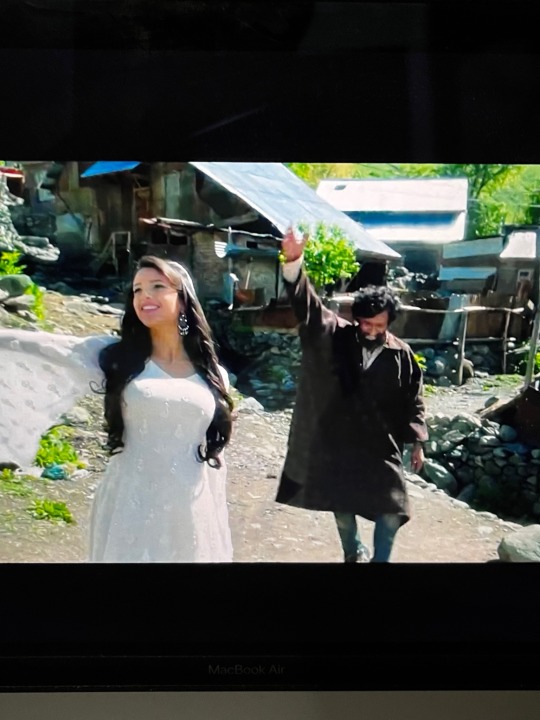

Who is Laila? Who is Tara, or even Heer? They are not put in a story, to play their role of a lover, turning their lovers against the world or his family. They are not supposed to be conscious of the importance of their part in the bigger picture of Imtiaz Ali’s final thought. I don’t think so. They are not meant to know the mysteries of what lies on the other side of these questions or even be intrigued by these questions. Why?
Because they are beautiful metaphors of the utmost innocence, beyond and above anything ‘worldly’ we have to put up with, to survive.
And when Imtiaz Ali brings together a Qais and a Laila, it is not to create another Raj and Simran but to shake Qais’ or Ved’s world into disorder and bring to him those same questions of what lies “Pahad ke uss paar’’ or what is even the need of that Pahad? Laila, the metaphor, is his way to the answer and sometimes, she IS the answer.
Imtiaz Ali may provide different plots, ambitions, backgrounds; only to ditch the mundane and the superficialities of society, for ‘’…what you love and let it kill you’’ (Charles Bukowski). His philosophy resonates with me and since I am someone who deals with those existential questions day in and day out, I have the greatest urge to be the male character in all of his films.
Jordan in Rockstar holds Heer’s hand and walks her towards the field, away from right and wrong.
Ved in Tamasha finally breaks free from what limits him, with Tara as his guiding Star.
It was when Qais becomes Majnu (Urdu for mad), I knew why I chose to watch Laila Majnu after all these years of its release. I know the kind of effect these philosophical dramas have over me. I am all about the reaction that he gives in one noteworthy scene where he is talking to himself, leading to him getting hit with a stone and starts bleeding. He runs and he laughs. He is celebrating. He felt the rush, he was alive. His love was finally seen! He did not have to hide who he was anymore from anyone for the sake of this illusion of a world, now that he knows Laila is ‘real.’ The blood and the pain being the proof that he was not mad. He had his world in his Laila, walking with him all along, everywhere.
21 notes
·
View notes
Text
nct dream as bollywood songs

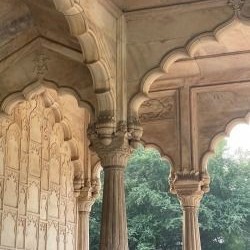
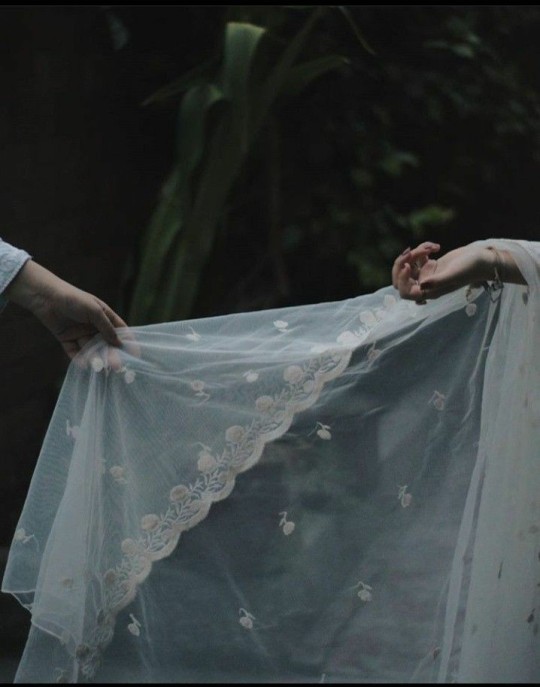
thought of making this after i saw this post by @yangkitties (which is so cute btw <3). praying this post finds it's way onto the dashboard of fellow bollywood - kpop enthusiasts
𐚁 lee minhyung
prem ki naiyya from apkgk - the awkward and adorable boy-next-door
saawali si raat from barfi - honestly all songs from this gem of a film should be the soundtrack for mark and his best friends to lovers trope
𐚁 huang renjun
sham from aisha - truly the embodiment of the soft boy aesthetic what can i say
sheila ki jawaani from tees maar khan - but he's also a bad bish so
𐚁 lee jeno
mast magan from 2 states - he's just the sweetest and softest, a lot like this song
ang laga de from ramleela - it's just so...uh *coughs* so *clears throat* freaking hot sensual...yeah * looks away flustered*
𐚁 lee donghyuck
illahi from yjhd - i can totally see him being bunny (the character, NOT the animal) in some other universe and i love this song so
sooraj ki baahon mein from znmd - need i explain?
matargashti from tamasha - the ranbir kapoor character to hyuck pipeline needs to be studied
𐚁 na jaemin
gulaabi from shudh desi romance - i mean the jaemin = pink logic yes. but also if you imagine him in the mood of this song- calm but somehow playful and adventurous. it makes sm sense
uff teri ada from karthik calling karthik - because uff teri ada indeed
𐚁 zhong chenle
drama queen from hasee toh phasee- sass, wit, theatrics. this song IS him.
twist from love aaj kal - unbelievably groovy. he's very cool and so is the song.
𐚁 park jisung
kahani from laal singh chaddha - i swear i'm not trying to baby him. he's a grown man ik, but his presence is so pure and innocent :(( and i love how calm this song makes me feel
dhoom again from dhoom:2 - just fits his aesthetic (plus he would obliterate the choreo)
#nct#nct dream#mark lee#nct haechan#nct mark#nct renjun#nct jeno#jeno#jaemin#nct jaemin#nct donghyuck#chenle#park jisung#nct jisung#nct chenle#huang renjun#bollywood#music#kpop
48 notes
·
View notes
Text
Tamasha, a truly overlooked Bollywood masterpiece, whenever I recall this film, there's a specific song that never fails to send shivers down my spine "Agar tum saath ho". It’s a song for everyone- the ones who believe in love, the ones who don’t and the ones who are trying. For even the ones who have won in love knows what it is to lose. The song narrates the timeless struggle between the heart and the mind. Tara, dressed in deep red tones, driven by her heart. Ved, in lighter beige attire, is driven by his brain.
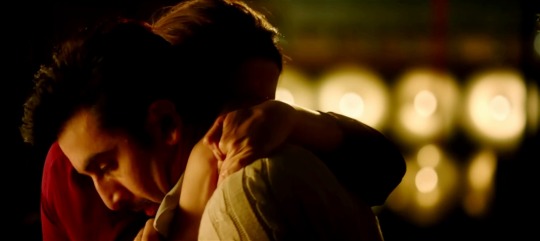
In this moment, Tara tightly hugs Ved, as if pleading silently for him to stay. The way in which she holds him carries an emotional weight adding a layer of emotion and urgency to the scene, suggesting that words may not be enough to convey what she feels, and her actions speak volumes in seeking his presence. She's scared to lose him, and she feels like the relationship is ending. Thus, holding on to him as tight as possible.
But Ved reluctantly pushes her away releasing himself from the hug. We can see the tears in his eyes. He seems to be struggling with inner conflicts, caught between what he wants and what makes sense.
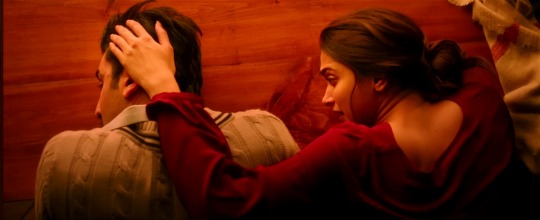
In a quiet moment, Tara and Ved rest their heads on the table. Gently stroking his head, as if trying to nudge his brain to fall in love with her. "Agar tum saath ho". But the brain is stubborn and determined, it is not ready to listen. It is practical. Ved looks away while they rest their heads on the table, he's hiding tears and feeling exposed and vulnerable. *Ved leaves*, "Bedard thi zindagi, bedard hai". Life was merciless, it is merciless, even if he stays with her. It does not make a difference.
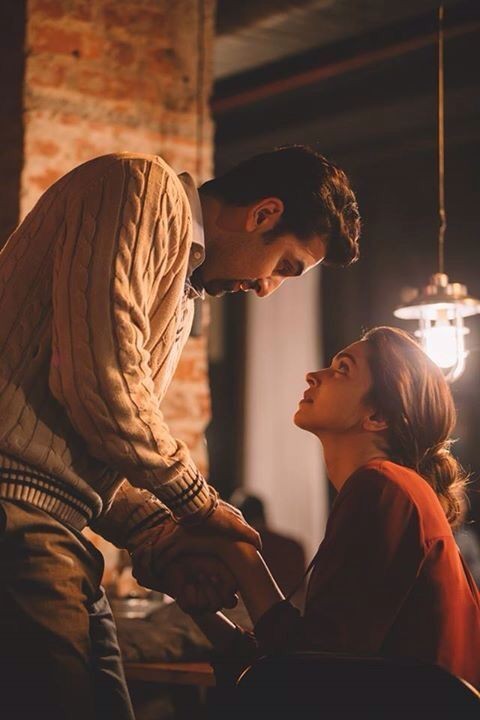
"Mujhe lagta hai ki baatein dil ki, hoti lafzon ki dhokhebaazi". It's like realizing that sometimes words aren't enough to express the depth of what your heart truly wants, what you truly feel for each other. Love is a relationship in which one converses through shared silences, we see that here once again in the deep silence of Tara and Ved.🌻🌙
#bollywood movies#bollywood#movies#quotes#imtiaz ali#ranbir kapoor#tamasha#deepikapadukone#deep thoughts
26 notes
·
View notes
Text
Mani Ratnam and the Female Experience in Cinema - A Rant
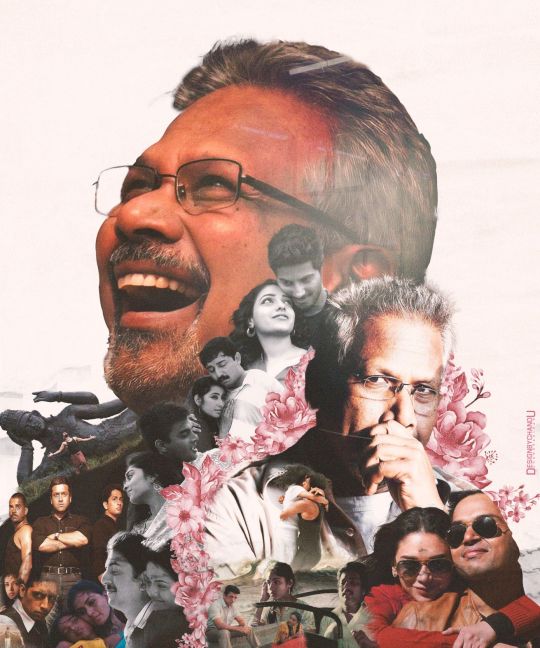
For context, I just finished binge-watching a bunch of films by various filmmakers, and I just realized how difficult some of them find it to let their characters just... be.
I don't know if this is just me, but I feel like Mani Ratnam has mastered the art of portraying characters as they are. What I mean is, a lot of other filmmakers tend to portray characters through their gaze. This becomes very apparent when you watch Imtiaz Ali's films, for example. I feel like he never really lets his female characters be. They are always trying to consciously or unconsciously "fix" the broken main character.
And this isn't just because of the fact that Imtiaz Ali's films generally revolve around the theme of love healing or fixing or completing you. Because if you think about it, Mani Ratnam has also made movies that revolve around the same theme, like OK Kanmani.
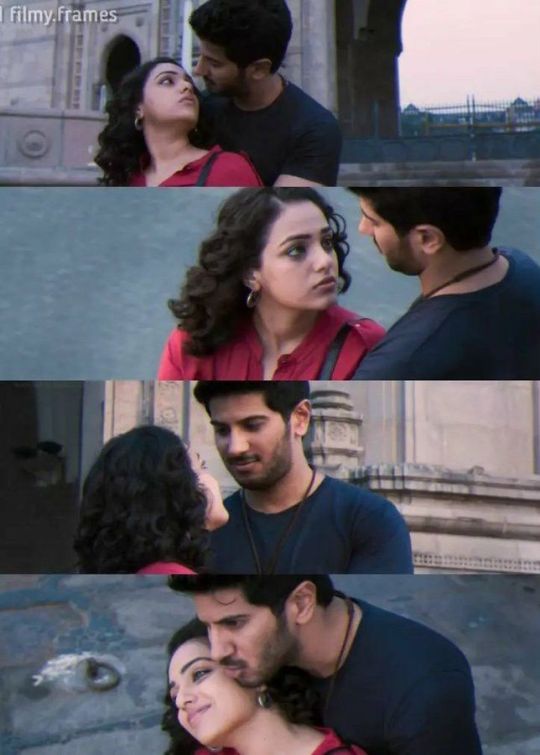
In the movie, the two main characters Tara and Adi are both young ambitious people who think that marriage would tie them down and are running from various incidents from their past as well as parts of their own adulthood and identity. All of this is subtly explored in the film, and the process of both of these people healing each other and unknowingly helping each other feel safe accepting these parts of each other is portrayed amidst colorful frames and AR Rahman's beautiful tunes.
But the difference between the works of these two filmmakers is that in Imtiaz Ali's films ranging from Jab We Met to Tamasha and Jab Harry Met Sejal, each of these films show a very one-dimensional female character. She's the manic pixie dream girl when the male lead needs to renew his faith in love, she's angry when he needs to learn something, and she's sad or sick when he needs to prove his love or return his gratitude. It's like the female lead exists only for the sake of the male character, like she's more of a plot device than a person.
A similar fallacy can be seen in Gautham Vasudev Menon's films, too. Vinnai Thaandi Varuvaaya portrays the story of an aspiring filmmaker, Karthik, falling in love with his landlord's daughter, Jessy. The movie basically covers the suffering of Karthik in love that, in the end, translates into his first film. This is a great premise, but the issue I had with the movie is the fact that Jessy is barely a character. She's supposed to be the female lead, but sometimes it's like her brother's character (which only appears in around four or five scenes) is more fleshed out than hers. Her defining trait seems to be that she's indecisive.
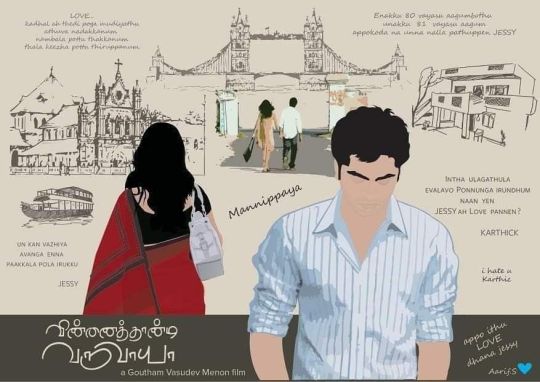
Although GVM had an opportunity to portray the very real struggles of modern Indian women navigating the identity of being a responsible daughter in their families along with being an individual with desires, ambitions and thoughts of their own, he reduces Jessy to a one-dimensional character whose sole purpose in the film is for Karthik to admire, and to eventually become Karthik's muse.
Now, you might argue that this is because of the difference in who the story is about: VTV is the story of Karthik, and Jab We Met is the story of Aditya, so obviously they would only feature the thoughts and aspirations of these characters. This has nothing to do with reducing female characters to plot devices or the amount of empathy and understanding the filmmaker has of women.
To that I'd say, you need to go watch Soorarai Pottru. This film by Sudha Kongara is inspired by the story of Captain Gopinath and is a masterclass in writing good supporting female characters. Sudha Kongara, being a woman herself, knows how to portray a woman in a supporting role without compromising on the personhood of the woman. The character Bommi is bold, loud and ambitious, not only when it's convenient for the male character.
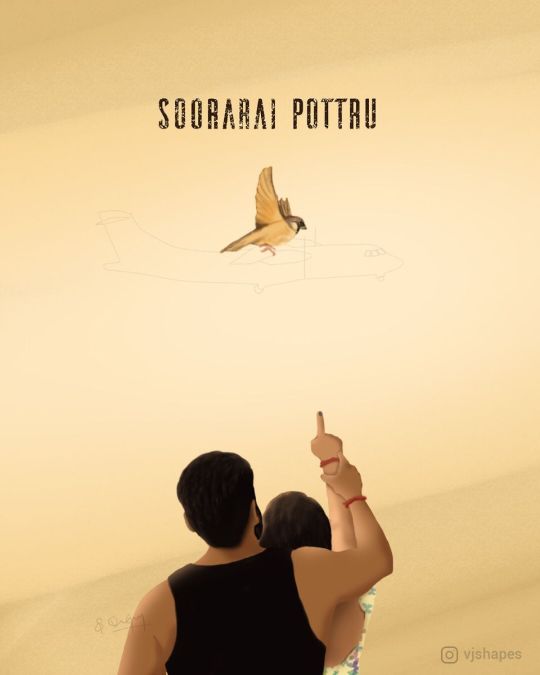
For example, there's a scene where Bommi tries to convince her husband to take tuition classes for someone because the airline isn't doing well. He acts out in anger, and instead of retreating after apologizing a bunch like the female characters of most other films, she tells him to show all his pride and anger in getting his airline to do better. Does this give the male lead a boost of determination, or impact his arc in any way? Not really. That dialogue is just there because that's what that character would've done in that situation. And this clarity on the personhood of the supporting characters, on the layers of quirks and traits that make them, is what most male filmmakers lack.
I feel like one other mainstream male director who is able to accomplish this, to some extent, at least, in Sanjay Leela Bhansali. All of his female characters seem to have some depth, at least. However, one trap that he seems to fall into is boxing his female characters into the Madonna-Whore complex. His female characters are either innocent, shy women who serve the patriarchy with all their might, and only show any signs of boldness or intelligence in the absence of their fathers or husbands, or they're bold, they question the patriarchy and they make their own decisions, but they're tawaifs or prostitutes or just "fallen women."
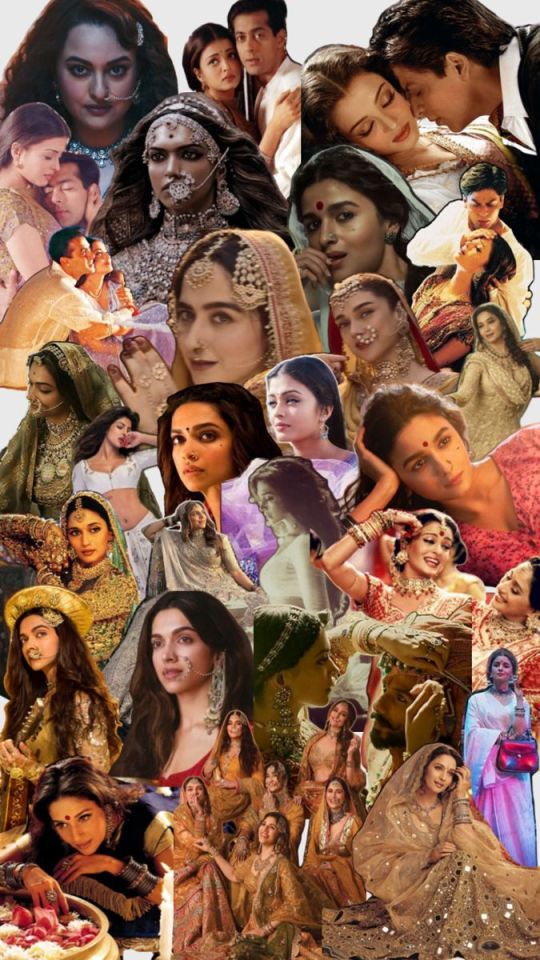
The complexities of both of these archetypes are thoroughly examined, the story moves without any character development feeling forced, and each of these types of women are worshipped, but the thing is, they're still less characters and more archetypes.
All this to say, male privilege and a historical disregard for the female experience has resulted in most male filmmakers just not knowing how to depict female characters in their films, but Mani Ratnam is different. I don't know if it's because of all the wonderful women in his life and team who are able to express themselves and talk about their experiences using cinema as an art form, like Suhasini Mani Ratnam and Sudha Kongara herself, who worked in Mani Ratnam's team for five years before taking off on her own, or because of Mani Ratnam's tendency to talk to people from all walks of life and actually listen to them with empathy, but he seems to be the only mainstream Indian filmmaker who is able to portray all of his characters, male and female alike, with equal depth.
#the female experience#male filmmakers#mani ratnam#sudha kongara#sanjay leela bhansali#imtiaz ali#gautham vasudev menon
2 notes
·
View notes
Text

Today marks the 42nd death anniversary of Bharat Vyas, the writer of the timeless prayer song “Aye Malik Tere Bande Hum” and many other classic songs in various films. Bharat Vyas was a leading lyricist of the golden era of Hindi film music, writing songs for movies in the 1950s and 1960s. He was well-known for his work with the famous director V. Shantaram, penning lyrics for many memorable songs. Some of his notable films include Navrang, Goonj Uthi Shehnai, Rani Rupmati, Do Aankhen Barah Haath, Kavi Kalidas, Saranga, Janam Janam Ke Phere, and Stree. Born in Churu, Rajasthan on December 18, 1918, he moved to Bombay after finishing his studies in Calcutta. Bharat Vyas began his Bollywood career as a lyricist with Duhaai (1943), writing all nine songs for the film. The music of Duhaai caught the attention of producer-director W. Z. Ahmed, who owned Shalimar Pictures. At Shalimar, Bharat Vyas wrote 12 songs for the film Prem Sangeet. His major success at Shalimar was Man Ki Jeet (1944), where his song “Aye Chand Na Itarana, Aate Hein Mere Sanyya” became a big hit. He developed a close working relationship with composer Khemchand Prakash, creating musicals like Ziddi, Bijalee, Tamasha, and Muqaddar. The 1950s were the most productive years for Bharat Vyas. He collaborated with top directors like Bimal Roy, V. Shantaram, and Vijay Bhatt. During this time, he wrote some of the most beautiful songs for films like Chandralekha, Parineeta, Toofan Aur Diya, Do Aankhen Barah Haath, Sahara, Anhulimal, Suvarna Sundari, Kavi Kalidas, Navrang, Goonj Uthi Shehnai, Rani Rupmati, Saranga, Janam Janam Ke Phere, Hum Hindustani, Stree, and Boond Jo Ban Gayi Moti. He also tried his hand at film direction with Rangeela Rajasthani (1949) and a few other Rajasthani films. Despite his success with many social films, Bharat Vyas became typecast as a lyricist for historical and mythological films, with most of his work in the 1960s falling into these genres. He continued to work through the 1970s and early 1980s, but the number of films he worked on decreased during this period. Bharat Vyas passed away in Mumbai on July 5, 1982. At the time of his death, he was working on a project to present the Ramayana in poetic form, set to music by Shyam Sagar. He was also directing two Rajasthani films. A brilliant poet, Bharat Vyas is remembered for his pure Hindi. Anyone with an appreciation for the language can quickly recognize his genius.
2 notes
·
View notes
Note
Tamasha and Taare Zameen Par- 2 films are a must watch! You will absolutely love them!
omg i remember someone i know gushing about taare zameen par years and years ago this is wonderful thank you!!!!
7 notes
·
View notes
Text
I'm confused... Is tamasha movie good?? like the reviews are good but then google says 62% liked the film..so idk
10 notes
·
View notes
Text
Somehow for the last 8 years, Tamasha had an enormous imapact on my life. It's exceptional and I could talk about ved and tara for HOURS. Isn't it strange? To have a piece of fiction have such potential effects on you?
I've watched this masterpiece multiple times and each time I do, I discover something more unique and beautiful about the film. I owe my love for storytelling, Indian mythology and folklore to this gem , and Corsica, ofcourse - CORSICA!
I was Fifteen when i first watched tamasha and all i wanted was to live in that secluded town in Corsica where Ved and Tara first met! Away from all the 'drama' , drinking wine and crashing into fancy french restaurants and dancing to matargashti by the cliff!It's been 6 years and i still feel the same! 🥺✨
11 notes
·
View notes
Text
0 notes
Text
Adnan Siddiqui Reveals Details of Nauman Ijaz Message Regarding Gentleman
0 notes
Text
Alka Yagnik: Biography, Top 20 Best Bollywood Music
Alka Yagnik, a name synonymous with melodious Bollywood tunes, has etched an indelible mark in the hearts of music lovers worldwide. From soulful classical music to foot-tapping Bollywood hits, her journey is a testament to her immense talent and dedication. Let’s dive into the life and achievements of this legendary playback singer.
Alka Yagnik Best Selected Bollywood Music Free Download
Early Life and Background
Born on March 20, 1966, in Kolkata, Alka Yagnik was destined for musical greatness. Her mother, Shubha Yagnik, a renowned classical singer, undoubtedly influenced her early inclination towards music. Growing up in a musically rich environment, Alka's tryst with music began at a very young age.
Initial Struggles and Breakthrough
At the tender age of ten, Alka's mother decided to take a leap of faith and moved to Mumbai to provide better opportunities for her daughter’s burgeoning talent. The initial years were tough, marked by auditions and small singing gigs. However, Alka’s talent did not go unnoticed for long.
Classical Music Training
Classical music played a pivotal role in shaping Alka Yagnik’s career. Trained rigorously under her mother’s guidance, she developed a strong foundation in classical music. This training not only honed her skills but also set her apart in the competitive Bollywood music industry.
First Major Breakthrough
Alka’s first significant break came with the song for the film "Payal Ki Jhankaar" in 1980. This was followed by “Mere Angane Mein” from the film "Laawaris" in 1981 and "Hamari Bahu Alka" in 1982. These early songs laid the groundwork for her illustrious career.
Rising Stardom
The turning point in Alka Yagnik’s career was the song "Ek Do Teen" from the film "Tezaab" in 1988. This song became a massive hit, catapulting her to stardom and winning her the first of many Filmfare Awards for Best Female Playback Singer.
Awards and Recognition
Alka Yagnik’s talent has been recognized with numerous awards. She is a record seven-time winner of the Filmfare Award for Best Female Playback Singer, with 36 nominations in total. She has also received the National Film Award, among several other prestigious accolades.
Signature Style and Contributions
Alka Yagnik's voice is known for its versatility and emotional depth. Whether it’s a peppy dance number or a soulful ballad, her ability to convey emotions through her singing is unparalleled. Her contributions to Bollywood music are immense, with a repertoire that spans various genres and styles.
Collaborations with Music Directors
Throughout her career, Alka Yagnik has collaborated with many legendary music directors, including Laxmikant-Pyarelal, Nadeem-Shravan, and Anu Malik. These collaborations resulted in some of the most memorable songs in Bollywood history and solidified her status as a top playback singer.
Popular Songs and Hits
Some of Alka Yagnik’s most iconic songs include “Taal Se Taal Mila” from "Taal", “Choli Ke Peeche” from "Khalnayak", and “Agar Tum Saath Ho” from "Tamasha". Each of these songs showcases her incredible range and ability to bring lyrics to life with her voice.
Influence on Bollywood Music
Alka Yagnik has significantly influenced Bollywood music, setting high standards for vocal performance. Her success paved the way for many aspiring singers, and her style has inspired countless artists in the industry.
Personal Life
Despite her busy career, Alka Yagnik has managed to keep her personal life relatively private. She is married and has a daughter, balancing her family life with her professional commitments seamlessly.
Legacy and Impact
Alka Yagnik’s legacy in Indian music is profound. She has left an indelible mark on the industry, influencing not just her contemporaries but also the new generation of singers. Her songs continue to resonate with audiences, proving the timelessness of her talent.
Current Activities and Projects
Even today, Alka Yagnik remains active in the music industry. She continues to perform in concerts, participate in music reality shows, and work on new projects, showcasing her enduring passion for music.
Conclusion
Alka Yagnik's journey from a young girl singing bhajans to a celebrated playback singer is truly inspirational. Her dedication, talent, and passion have made her a legendary figure in Indian music. As she continues to enchant audiences with her melodious voice, her legacy only grows stronger.
FAQs
- What is Alka Yagnik's most famous song?
- Alka Yagnik's most famous song is arguable "Ek Do Teen" from the film "Tezaab".
- How many awards has Alka Yagnik won?
- Alka Yagnik has won numerous awards, including seven Filmfare Awards for Best Female Playback Singer.
- What makes Alka Yagnik's voice unique?
- Alka Yagnik's voice is known for its versatility, emotional depth, and ability to convey various emotions seamlessly.
- How did Alka Yagnik start her career?
- Alka Yagnik started her career by singing bhajans and performing on All India Radio at a young age before moving to Mumbai for better opportunities.
- What is Alka Yagnik doing now?
- Alka Yagnik continues to be active in the music industry, performing in concerts, participating in music shows, and working on new projects.
Read the full article
0 notes